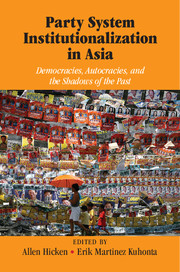Book contents
- Frontmatter
- Dedication
- Contents
- List of Figures
- List of Tables
- List of Contributors
- Acknowledgments
- 1 Introduction: Rethinking Party System Institutionalization in Asia
- 2 The Antidemocratic Potential of Party System Institutionalization: Malaysia as Morality Tale?
- 3 Institutionalized Succession and Hegemonic Party Cohesion in Singapore
- 4 Party System Institutionalization in Japan
- 5 Long in the Making: Taiwan’s Institutionalized Party System
- 6 The Making and Unmaking of the Communist Party and Single-Party System of Vietnam
- 7 The Institutionalization of the Communist Party and the Party System in China
- 8 Party System Institutionalization in India
- 9 Party and Party System Institutionalization in Cambodia
- 10 Explaining Party System Institutionalization in Indonesia
- 11 South Korea’s Weakly Institutionalized Party System
- 12 Thailand’s Feckless Parties and Party System: A Path-Dependent Analysis
- 13 Party and Party System Institutionalization in the Philippines
- 14 Party System Institutionalization: Reflections Based on the Asian Cases
- Index
- References
9 - Party and Party System Institutionalization in Cambodia
Published online by Cambridge University Press: 18 December 2014
- Frontmatter
- Dedication
- Contents
- List of Figures
- List of Tables
- List of Contributors
- Acknowledgments
- 1 Introduction: Rethinking Party System Institutionalization in Asia
- 2 The Antidemocratic Potential of Party System Institutionalization: Malaysia as Morality Tale?
- 3 Institutionalized Succession and Hegemonic Party Cohesion in Singapore
- 4 Party System Institutionalization in Japan
- 5 Long in the Making: Taiwan’s Institutionalized Party System
- 6 The Making and Unmaking of the Communist Party and Single-Party System of Vietnam
- 7 The Institutionalization of the Communist Party and the Party System in China
- 8 Party System Institutionalization in India
- 9 Party and Party System Institutionalization in Cambodia
- 10 Explaining Party System Institutionalization in Indonesia
- 11 South Korea’s Weakly Institutionalized Party System
- 12 Thailand’s Feckless Parties and Party System: A Path-Dependent Analysis
- 13 Party and Party System Institutionalization in the Philippines
- 14 Party System Institutionalization: Reflections Based on the Asian Cases
- Index
- References
Summary
This chapter analyses party and party system institutionalization in Cambodia. The country provides an excellent case study that sheds some new light on the theoretical observations made in this volume. Since the country made a historic triple transition in the early 1990s (from war to peace, from command to market economics, and from political authoritarianism to electoral democracy) when four Cambodian armed factions and 18 other foreign states formally signed the Paris Peace Agreements on October 23, 1991, the country’s multiparty system and political parties have had more than 20 years to become institutionalized.
The concept of party system and party institutionalization is subject to debate, but this chapter works within the analytical framework developed in this volume. Party and party system institutionalization, as the key dependent variable, is a process not necessarily associated with democratization based on formal or impersonal rules, norms, and decision-making procedures. Institutionalization is defined more or less as a process of stabilization or regularization: party systems become more and more stable over time, and electoral competition becomes less and less volatile because of their growing political legitimacy as measured in terms of growing public support and deepening social roots. Moreover, political parties become less factionalized or more and more organizationally cohesive.
- Type
- Chapter
- Information
- Party System Institutionalization in AsiaDemocracies, Autocracies, and the Shadows of the Past, pp. 212 - 235Publisher: Cambridge University PressPrint publication year: 2014
References
- 5
- Cited by

